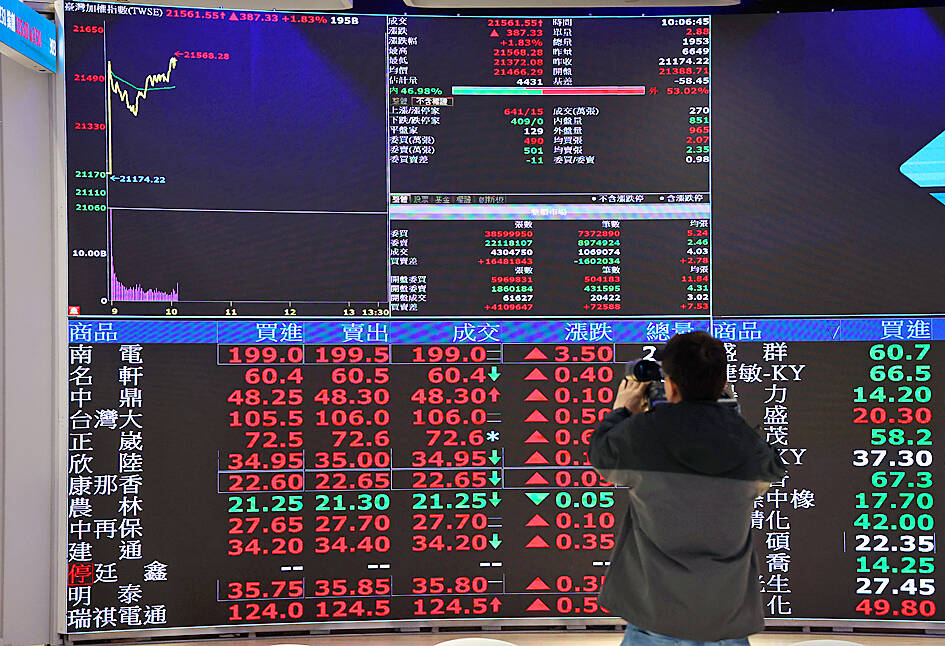Foreign funds snapped a two-month selling streak of Taiwanese equities last month amid renewed optimism around artificial intelligence (AI).
Overseas investors bought US$2.7 billion of Taiwanese shares, according to Bloomberg-compiled data.
That is a turnaround from when they sold stocks in March and April as Taiwan Semiconductor Manufacturing Co (TSMC, 台積電) cautioned over persistent weakness in consumer markets and funds rotated to rival South Korea.

Photo: CNA
Sentiment in chip stocks has recovered globally following another bullish forecast from AI chipmaker Nvidia Corp. Taiwan’s dominant position in the AI value chain would get another boost this week as tech giants gather for the nation’s annual electronics showcase event, Computex Taipei.
“Alongside Nvidia’s optimism, there was some cautious positioning on Taiwan earlier in the year which has eased,” Bloomberg Intelligence strategist Marvin Chen said. “While valuations are getting stretched, Taiwan is still Asia’s best proxy for the AI boom.”
Taiwan was the biggest recipient of foreign inflows last month among emerging Asian countries excluding China. That helped fuel a rally in TAIEX to a record high late last month and pushed the benchmark index to become one of the best performers in Asia this year.
Yesterday, the TAIEX moved sharply higher amid enthusiasm over AI development after a speech by Nvidia CEO Jensen Huang (黃仁勳) in Taipei a day earlier. The index closed up 362.54 points, or 1.71 percent, at 21,536.76.
TSMC, which is believed to provide advanced chips for Nvidia’s graphics processing units, led the gains throughout the session and closed 3.05 percent higher at NT$846.
Turnover on the main board totaled NT$433.32 billion (US$13.38 billion) yesterday, with foreign institutional investors buying a net NT$2.9 billion in shares, Taiwan Stock Exchange data showed.
There is still scope for global funds to keep buying given that foreign ownership of TSMC — the largest stock on the index with a weighting of 32 percent — is below the record 80 percent level seen in 2017.
A strong earnings outlook for Taiwanese firms also bodes well for foreign flows into the market. The 12-month forward profit estimate for the TAIEX has risen by more than 8 percent this year compared with little change on the MSCI Asia Pacific Index, data compiled by Bloomberg showed.
A delay in the US Federal Reserve’s rate cuts might still dent the tech rally, while any escalation in cross-strait tensions might deter foreign interest in Taiwan’s stock market.
“Strength of Nvidia and the underlying AI/server theme continue to support associated stocks in Taiwan,” Robeco Hong Kong Ltd Asia Pacific equities head Joshua Crabb said.
Stocks also remain attractive to foreign investors as they “are a lot cheaper than US counterparts,” he added.
Additional reporting by CNA

UNCERTAINTY: Innolux activated a stringent supply chain management mechanism, as it did during the COVID-19 pandemic, to ensure optimal inventory levels for customers Flat-panel display makers AUO Corp (友達) and Innolux Corp (群創) yesterday said that about 12 to 20 percent of their display business is at risk of potential US tariffs and that they would relocate production or shipment destinations to mitigate the levies’ effects. US tariffs would have a direct impact of US$200 million on AUO’s revenue, company chairman Paul Peng (彭雙浪) told reporters on the sidelines of the Touch Taiwan trade show in Taipei yesterday. That would make up about 12 percent of the company’s overall revenue. To cope with the tariff uncertainty, AUO plans to allocate its production to manufacturing facilities in

TAKING STOCK: A Taiwanese cookware firm in Vietnam urged customers to assess inventory or place orders early so shipments can reach the US while tariffs are paused Taiwanese businesses in Vietnam are exploring alternatives after the White House imposed a 46 percent import duty on Vietnamese goods, following US President Donald Trump’s announcement of “reciprocal” tariffs on the US’ trading partners. Lo Shih-liang (羅世良), chairman of Brico Industry Co (裕茂工業), a Taiwanese company that manufactures cast iron cookware and stove components in Vietnam, said that more than 40 percent of his business was tied to the US market, describing the constant US policy shifts as an emotional roller coaster. “I work during the day and stay up all night watching the news. I’ve been following US news until 3am

Taiwan will prioritize the development of silicon photonics by taking advantage of its strength in the semiconductor industry to build another shield to protect the local economy, National Development Council (NDC) Minister Paul Liu (劉鏡清) said yesterday. Speaking at a meeting of the legislature’s Economics Committee, Liu said Taiwan already has the artificial intelligence (AI) industry as a shield, after the semiconductor industry, to safeguard the country, and is looking at new unique fields to build more economic shields. While Taiwan will further strengthen its existing shields, over the longer term, the country is determined to focus on such potential segments as

COLLABORATION: Given Taiwan’s key position in global supply chains, the US firm is discussing strategies with local partners and clients to deal with global uncertainties Advanced Micro Devices Inc (AMD) yesterday said it is meeting with local ecosystem partners, including Taiwan Semiconductor Manufacturing Co (TSMC, 台積電), to discuss strategies, including long-term manufacturing, to navigate uncertainties such as US tariffs, as Taiwan occupies an important position in global supply chains. AMD chief executive officer Lisa Su (蘇姿丰) told reporters that Taiwan is an important part of the chip designer’s ecosystem and she is discussing with partners and customers in Taiwan to forge strong collaborations on different areas during this critical period. AMD has just become the first artificial-intelligence (AI) server chip customer of TSMC to utilize its advanced